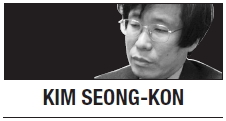When I entered elementary school right after the Korean War, there were not so many books for us to read in South Korea. The postwar landscape was bleak and barren, and few sources of knowledge and entertainment were available except for some pulp magazines, vacuum tube radios and movies. When I was given my textbooks on the first day of school, therefore, I was overjoyed and filled with anticipation. During those days, our textbooks were not only a valuable means of information and knowledge, but also a prime source of pleasure and entertainment.

While reading one of my textbooks, I encountered an intriguing story of a rabbit that I still remember today. It was an account of a smart, but weak rabbit that felt humiliated next to a mighty elephant and a gigantic whale that boasted of their supremacy in the sea and the land, respectively. The wise rabbit conjured up a plan to get even with the two huge, arrogant animals and challenged them, saying, “I am stronger than you. Try to beat me at a game of tug-of-war.” Both the elephant and whale accepted the challenge.
So the rabbit tied a rope around the elephant’s hefty waist. Then the rabbit grabbed the other end of the rope, hurriedly went to the whale and tied it to the tail of the whale. Both the elephant and the whale thought that they were tied to the rabbit. The rabbit told the two animals, “When I say ‘pull,’ pull with all your might. Now, pull!” As the whale tried to swim away from the shore, and the elephant tried to march into the jungle, the rope snapped, and the two gigantic animals tumbled over. The elephant and the whale could not figure out how such a tiny rabbit was able to beat them at the game of tug-of-war, but they began treating the rabbit with great respect.
Years later, I realized that the story was a splendid metaphor of the diplomatic relationship between Korea, China and Japan. Like the small rabbit, we live between two mighty countries. Historically, we have been frequently humiliated and pushed around by the two bullying neighbors. The story of the rabbit metaphorically tells us how we can gain respect from the two stronger countries even though we are smaller and weaker.
Regrettably and embarrassingly, however, our political leaders in the past lacked the wisdom of the rabbit. Instead of maneuvering cleverly between the two behemoths, our leaders either sided with the elephant or the whale, losing respect and independence eventually. We may think that our geopolitical situation seriously disadvantages us, but this doesn’t have to be the case. On the contrary, if we take advantage of our geographical situation, we will not only survive but also thrive, without losing respect from our neighboring countries.
Another interesting episode in our textbook was a story of two goats that met head-to-head in the middle of a bridge. Both of them insisted, “Let me go first.” They doggedly blocked each other’s way and viciously fought with their pointed horns. Finally, both of them fell off the bridge and neither was able to pass through. Many years later, I also realized that the short story was a superb allegory of the confrontation not only between North and South Korea, but also between the left and the right in South Korea. If we, too, become self-righteous and unceasingly fight each other, we will all fall down eventually, just like the two stubborn goats. Then no one will win.
Unfortunately, however, this dark legacy still continues. For example, the two Koreas still confront each other in ever-lasting hostility. South Korea is also still sharply divided by the left and the right which antagonize each other like archenemies. The two self-righteous, stubborn goats can be found everywhere in today’s Korean society ― in the political arena, in educational institutions, and even in literary circles. Unless we learn to negotiate and yield, we will all go down together.
One of our textbooks also contained a chapter on the economic miracle of the Rhine River. At that time, German economic growth was skyrocketing and as a people living in a war-ridden, destitute country, we admired and envied the astonishing economic development and superb technology of Germany. At that time, the German success was called the “Miracle on the Rhine.”
Sixty years have passed and now South Korea is known to be a country that has achieved the “Miracle on the Han River.” Living in an affluent, advanced society today, I often look back upon the old days when my generation was inspired by the story of Germany, which was miraculously recuperating from the debris of World War II.
Sometimes we can learn much from our textbooks. Oftentimes, however, we do not understand even the most basic knowledge presented in our textbooks and continue to make the same mistakes as we did 60 years ago. Perhaps we need to start reading our textbooks more closely.
By Kim Seong-kon
Kim Seong-kon is a professor of English at Seoul National University and president of the Literature Translation Institute of Korea. ― Ed.








